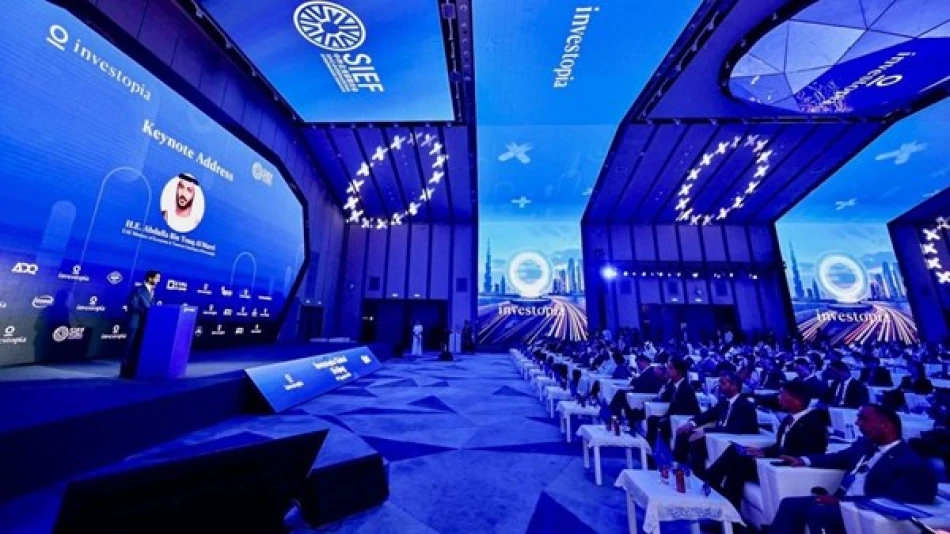
China and UAE Strengthen Economic and Investment Partnerships: Investopedia Insights
UAE-China Economic Partnership Deepens as Beijing Summit Yields Five Strategic Agreements
The UAE and China are accelerating their economic integration through targeted investments in green energy, artificial intelligence, and precision medicine, as demonstrated at the inaugural Investopia Beijing summit. With Chinese business licenses in the UAE surging 18% year-over-year to 16,500, the partnership reflects both nations' strategic pivot toward new economy sectors that could reshape regional trade dynamics.
Strategic Timing Amid Global Economic Realignment
The timing of Investopia Beijing—the 19th edition of the UAE's global investment dialogues and the first held in China—signals a deliberate effort to strengthen economic ties as both nations navigate shifting global supply chains. UAE Minister of Economy and Tourism Abdullah bin Touq Al Marri emphasized that the summit represents a "new milestone" in bilateral relations, focusing on sustainable development and economic innovation.
This deepening partnership comes as the UAE positions itself as a bridge between East and West, leveraging its strategic location and business-friendly environment. China, meanwhile, continues expanding its Belt and Road Initiative presence in the Middle East, with the UAE serving as a crucial regional hub.
Five MOUs Signal Concrete Cooperation
The summit's most tangible outcome was the signing of five memorandums of understanding spanning multiple sectors:
Trade and Investment Infrastructure: Investopia partnered with the China Council for the Promotion of International Trade (CCPIT) Beijing branch to enhance commercial links, while Abu Dhabi Investment Office signed with the Shanghai International Entrepreneur Federation (SIEF) to facilitate Chinese company expansion in the emirate.
Precision Medicine Breakthrough: Two significant healthcare agreements emerged—P4ML partnering with Beijing Precision Medicine Center, and BAGO Strategic Consulting developing innovative healthcare solutions. These deals position both nations at the forefront of personalized medicine, a sector projected to reach $3.7 trillion globally by 2030.
New Economy Sectors Drive Growth
The summit's six strategic sessions revealed priority areas for bilateral cooperation that extend far beyond traditional trade. The focus on robotics, electric vehicles, and advanced manufacturing reflects both nations' commitment to Fourth Industrial Revolution technologies.
Clean Energy Collaboration Accelerates
Discussions on solar, wind, and hydrogen energy cooperation align with both countries' net-zero commitments. The UAE's Masdar, represented by CEO of Green Hydrogen Mohamed Abdul Qader Al Ramhi, is already active in Chinese renewable markets. This partnership could prove crucial as China dominates global solar panel production while the UAE develops its position as a regional green hydrogen hub.
Smart Infrastructure and Logistics
The emphasis on AI and blockchain technologies for ports, airports, and rail networks directly supports China's Belt and Road Initiative while enhancing the UAE's position as a global logistics hub. With Dubai handling over 15 million TEUs annually and Chinese trade representing a significant portion, technological upgrades could substantially boost bilateral trade efficiency.
Market Implications and Investment Outlook
The 18% increase in Chinese business licenses in the UAE—reaching 16,500 by July 2025—indicates robust private sector confidence. This growth rate significantly outpaces the UAE's overall business license growth, suggesting Chinese companies view the Emirates as an increasingly attractive regional headquarters location.
For investors, this partnership offers exposure to several high-growth sectors. The precision medicine agreements could create opportunities in healthcare technology, while clean energy cooperation may benefit renewable energy investors in both markets. The focus on venture capital and sovereign wealth fund collaboration suggests more institutional investment flows ahead.
Regional Competitive Dynamics
This UAE-China deepening partnership occurs as regional competitors like Saudi Arabia and Qatar also court Chinese investment. However, the UAE's advantage lies in its established Chinese business community—533 Chinese commercial agencies operate in the country—and its reputation for regulatory stability and ease of doing business.
The partnership also positions both nations to compete more effectively with Singapore's role as Asia's financial hub and Switzerland's position in precision medicine. By combining the UAE's financial infrastructure with China's manufacturing capabilities, the alliance could create new value chains across multiple industries.
The presence of high-profile UAE business leaders, including Edge Group CEO Hamad Al Marrar and Bayt.com founder Rabea Ataya, demonstrates private sector commitment to the partnership's long-term success. As global trade patterns continue evolving, this UAE-China axis represents a pragmatic response to changing economic realities rather than mere diplomatic ceremony.
Most Viewed News

 Layla Al Mansoori
Layla Al Mansoori






